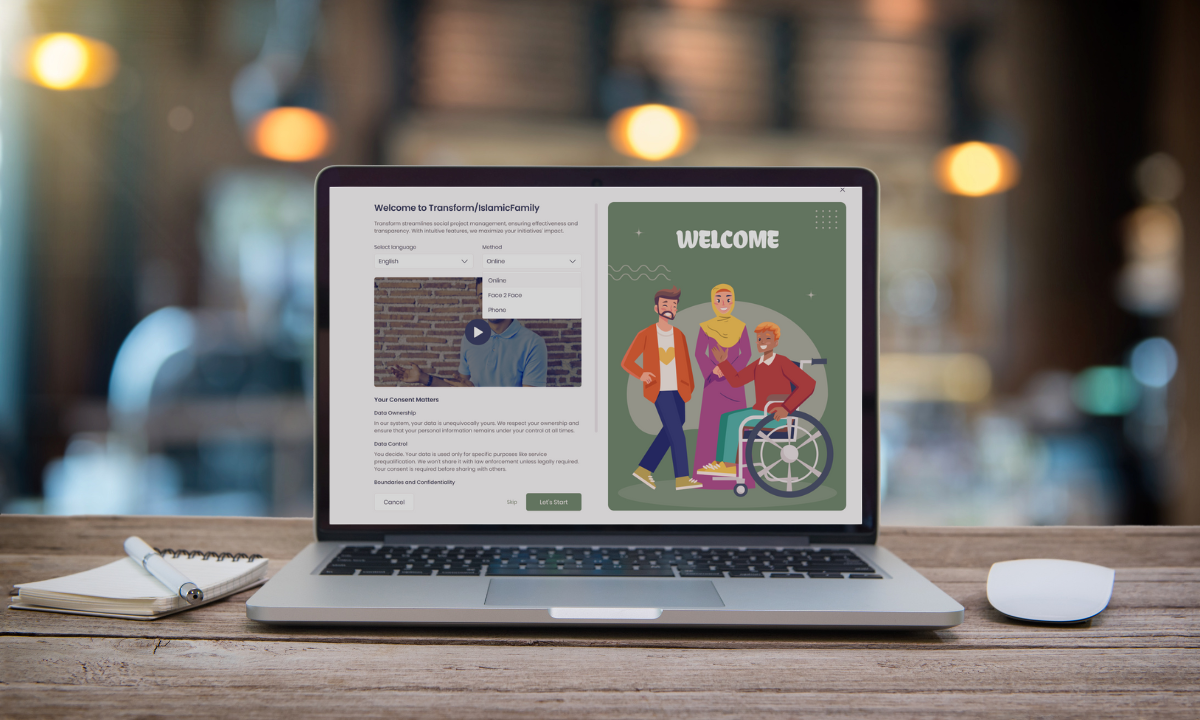How an Edmonton social services agency spun out its own tech products
Why It Matters
Technology that is built by and for the non-profit sector is hard to come by. Usually, non-profits end up using an amended version of technology that has been developed for businesses, which focus on transactions rather than relationships, said IslamicFamily’s Executive Director Omar Yaqub.

By launching its own technology social enterprise, an Edmonton-based social services agency hopes to help frontline staff across the sector better handle client data and case management.
The Islamic Family and Social Services Association (IFSSA) has created its own for-profit entity, Flourishing Systems, and tool, Transform, to ease the “administrative burden” that staff in non-profits are often faced with.
“As a social services agency ourselves … we experienced firsthand the frustration of inefficient systems and the emotional toll it took on both our team and the clients we served,” they wrote.
The agency partnered with Raj Rajakumar, a co-founder and head of product at an investor-backed app, who now serves as IFSSA’s head of product. Transform is the first tool they have launched.
Having consulted legal professionals, IFSSA decided to spin off Flourishing Systems and its tools into a separate subsidiary organization, to which the intellectual property is licensed. It’s uncommon to see a non-profit developing its own intellectual property, according to IFSSA’s executive director, Omar Yaqub.
“It is incredibly complex to build tech in social services,” Yaqub said. “Everyone who builds a social enterprise has to face wicked problems, like salary expectations between developers and social workers. That creates cultural friction.
“And how do you develop intellectual property within a non-profit, but still have ways to scale it? That requires corporate structures to be able to do it.
“You can’t always do that in the charitable space, so you have to build these hodgepodge structures to make it make sense,” he said.
Non-profits have unique software needs
The first tool developed by the social enterprise, Transform, is already being used by several non-profits and community groups, primarily based in Edmonton.
Transform is a case management tool designed specifically for non-profits and public sector organizations. For instance, software that is designed for for-profit companies to interact with their customers and clients might code contact details as a mandatory field.
However, for non-profit clients – some of whom may be in between addresses or phone numbers – Transform ensures that these details can be left blank.
“Rather than entering a bunch of erroneous numbers just so I can get through to the next field, and then forevermore having bad data, I can just add in a note saying that a person is between phone numbers,” Yaqub said.
“That’s what good, compassionate design looks like. There is a larger philosophy behind it, which is around data justice and data minimalism, which means that we don’t ask questions where we don’t need to.”
The team has also ensured that client data – particularly that of vulnerable communities they are serving – belongs to the individual rather than to the company. It is often the case that companies own any information that is entered into their systems, Yaqub has found.
Yaqub and Rajakumar hope that this focus on data quality can also eventually help non-profits benefit from large language models (LLMs), which is what drives artificial intelligence tools.
The team have begun to apply predictive modelling using a year’s worth of food bank data. in partnership with a university, they are building a model that can predict peak times for food needs in the community, such as the time of day or day of the week when the most food is deployed.
CANDORA, which provides community programming and outreach services, is one of the first users of Transform. The organization was already looking to upgrade its database, said associate director of business development Rebecca Steinhubl.
The charity was searching for technology that could be customized not only to each team within CANDORA, but also to the various funders that the charity had to report to, Steinhubl said.
“We wanted the ability to be a bit more hands-on, in-house, and not have to send out for adjustments or customizations on our forms any time a funder would change anything, or any time we wanted to update or pull data,” she said.
CANDORA and IFSSA had been working together in the local community for some time, and Steinhubl felt that that relationship made a difference in switching over to IFSSA-run technology.
“Working with another non-profit is a really big deal,” she said. “There are a lot of CMS (customer management systems) – the market is saturated – but they don’t all necessarily understand what the workflows are that we are going through.”
Given that the non-profit sectors in Canada and the United States are also vastly different, Steinhubl felt that working with a Canadian vendor would be more in line with CANDORA’s workflows. “It’s important to me that when transitioning to new tech that not only will our staff understand, but that the company or organizations we’re entering into partnership with will understand where we’re coming from as well.”

